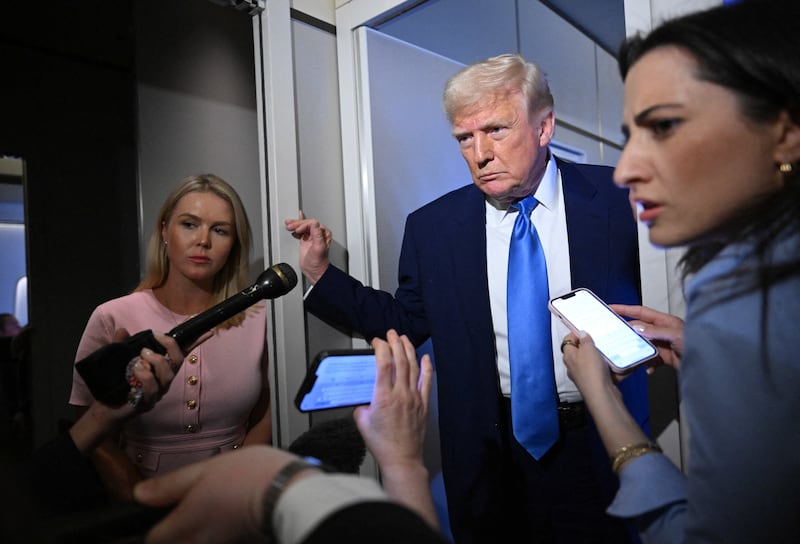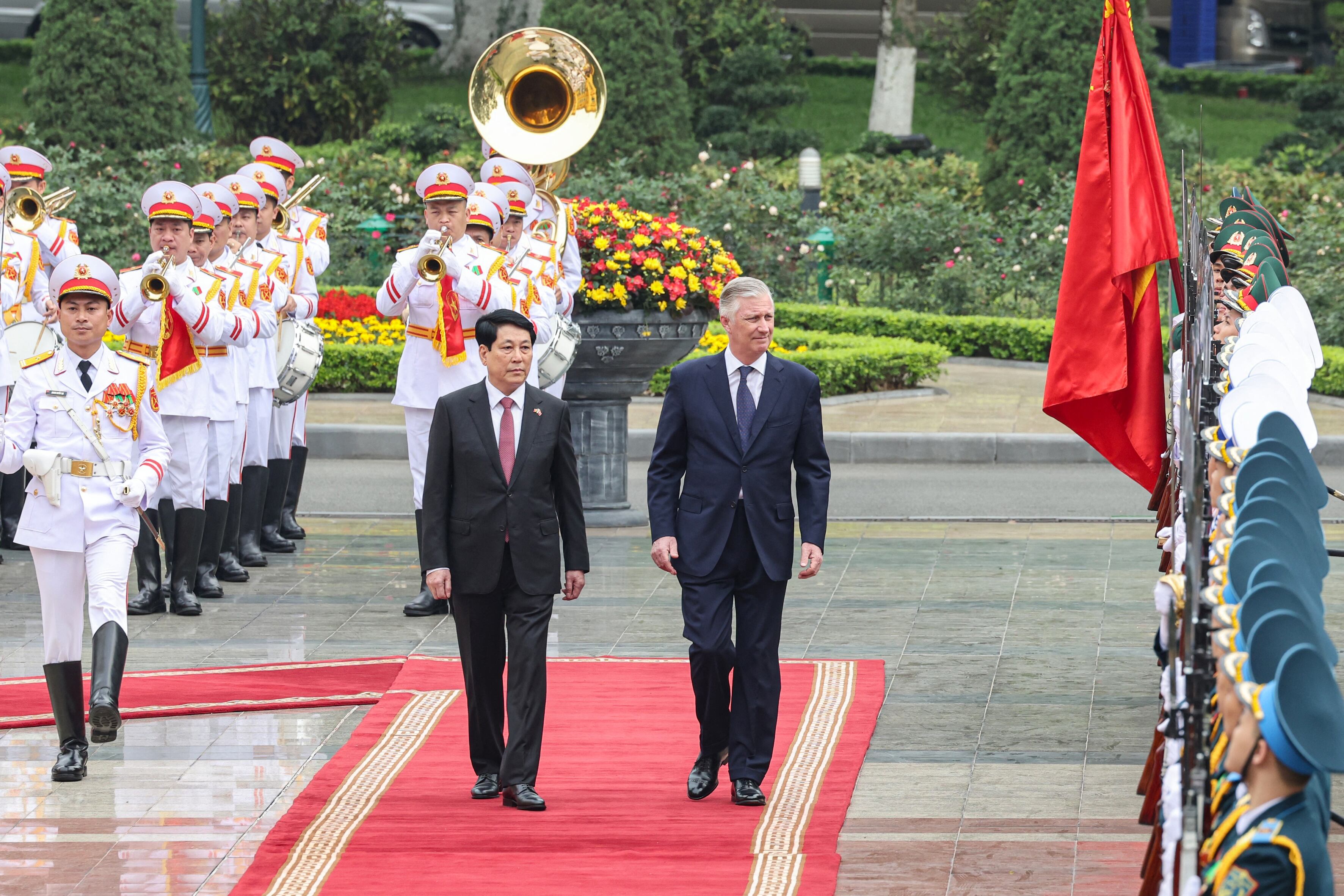Updated April 7, 2025, 09:15 a.m. ET
TAIPEI, Taiwan – China’s objections to new U.S. tariffs stalled a deal to sell off TikTok and keep it operating in the United States, said President Donald Trump on Sunday, emphasizing that he would not reverse tariffs on foreign nations unless the trade deficits that the U.S. faces with various countries, including China, disappeared.
Trump administration officials have been working on an agreement to sell the popular social media app, owned by China-based ByteDance, to an American buyer, as required by a bipartisan law enacted in 2024. But this also requires China’s approval.
“We had a deal pretty much for TikTok – not a deal but pretty close – and then China changed the deal because of tariffs,” Trump told reporters. “If I gave a little cut in tariffs they would have approved that deal in 15 minutes, which shows the power of tariffs.”
Trump on Wednesday signed a far-reaching “reciprocal tariff” policy at the White House, in which he imposed a 34% tariff rate on China. Coupled with the existing 20% tariffs on Chinese imports, the true tariff rate on China is now 54%.
China on Friday announced it was retaliating, with its own 34% tariff on all imports from the U.S. starting April 10. It also announced plans to restrict exports of some rare earth items.
Before Trump announced widespread tariffs, the TikTok deal was reportedly close, advanced by a consortium of U.S. investors, but Trump said China’s objections impeded the pact. The Washington Post reported earlier that Trump’s moves to heighten tariffs on China stalled the talks.
Trump previously said he may consider reducing China tariffs to help facilitate a TikTok deal.
The U.S. Congress had initially mandated that the short-video platform find a new, non-Chinese owner by Jan. 19 for or face a ban for national security reasons, with Trump later extending the deadline until April 5. On Friday, Trump announced on his Truth Social a second 75-day extension to the deadline to divest, signing an executive order to prevent the TikTok ban.
During his first term as president, Trump had tried to ban TikTok, but a U.S. federal judge ruled the president did not have the authority to ban the app. Following that judicial rebuke, Congress passed the bill calling for TikTok’s sale, which then-President Joe Biden signed.
Some lawmakers in the U.S. said that China could gain access to TikTok’s personal data for the purpose of influencing political opinion in the country, but the Chinese Foreign Ministry has said the country’s government has never asked companies to “collect or provide data, information or intelligence” held in foreign countries.
TikTok, which has offices in Singapore and Los Angeles, has said it prioritizes user safety.

Trump said that he would maintain tariffs on foreign nations unless the trade deficits the U.S. faces with various countries, including China, were eliminated.
“Hundreds of billions of dollars a year we lose with China,” Trump told reporters on Sunday
“And unless we solve that problem, I’m not going to make a deal,” said Trump, adding that he was “willing to deal with China, but they have to solve their surplus.”
The 10% baseline tariff imposed by Trump on almost all trading partners became effective Saturday morning, with a second wave of tariffs set to take effect Wednesday morning. These new measures, combined with recently implemented tariffs on foreign metals, automobiles, and goods from Canada, Mexico, and China, have increased U.S. import tariffs by nearly ten times their previous levels.
Trump’s trade policies have sparked widespread opposition, drawing criticism even from U.S. allies.
China responded with a series of aggressive countermeasures, while other countries are attempting to negotiate reduced rates.
Vietnam, which faces one of the highest proposed tariff rates at 46%, for instance, is requesting a 45-day postponement and has offered to eliminate its own tariffs.
Taiwan’s president, Lai Ching-te, on Sunday offered zero tariffs as the basis for talks with the U.S., pledging to remove trade barriers and saying Taiwanese companies would increase their U.S. investments.
Asian markets plunged on Monday, with Japan’s benchmark Nikkei falling by more than 8% shortly after opening.
Hong Kong’s Hang Seng index dropped by 9% in early trade, with shares in Chinese tech giants Alibaba and Tencent falling more than 8%.
In South Korea, trading on the Kospi index was halted for five minutes at 9.12 a.m. as stocks plummeted.
Taiwan’s stock exchange fell almost 10% on the Monday open, the first day of trading since the tariffs were announced due to a two-day holiday last week. Falls were driven by the world’s largest chipmaker TSMC and the world’s largest contract manufacturer Foxconn, and marked the largest daily point and percentage loss on record, according to local media.
Trump said he had spoken to leaders from Europe and Asia over the weekend, who hope to convince him to lower tariffs that are as high as 50% and due to take effect this week.
“They are coming to the table. They want to talk but there’s no talk unless they pay us a lot of money on a yearly basis,” he said.
Separately, U.S. Treasury Secretary Scott Bessent said more than 50 nations had started negotiations with Washington since last Wednesday’s announcement.
“He’s created maximum leverage for himself,” Bessent said on NBC News’ Meet the Press, referring to Trump.
Bessent added there was “no reason” to anticipate a recession, citing stronger-than-anticipated U.S. jobs growth last month, before the tariffs were announced.
Neither Trump nor Bessent named the countries or offered details about the talks.
Updated to note Trump’s extension of TikTok divest-or-ban deadline for a second time.
Edited by Mike Firn.

